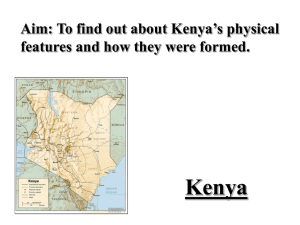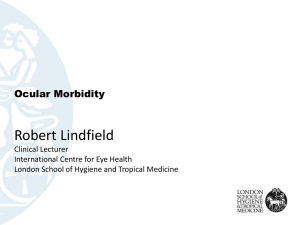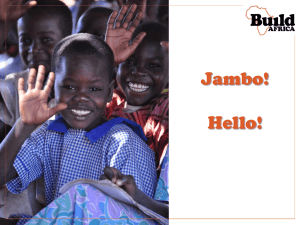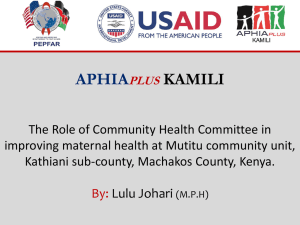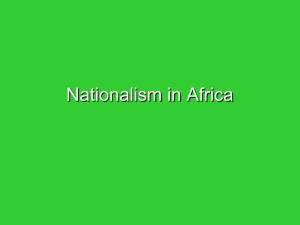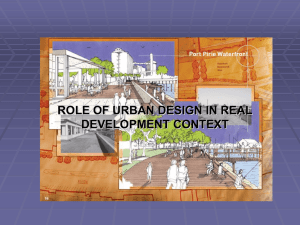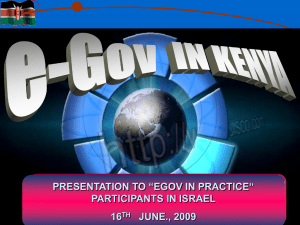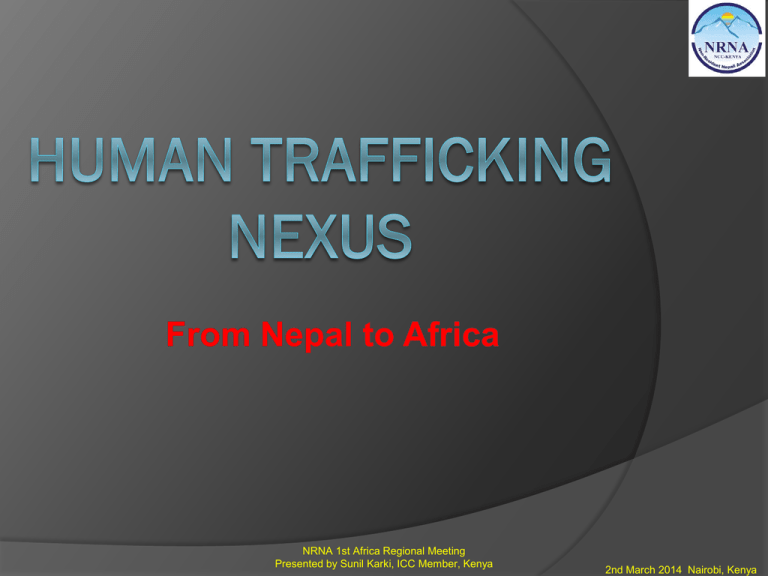
From Nepal to Africa
NRNA 1st Africa Regional Meeting
Presented by Sunil Karki, ICC Member, Kenya
2nd March 2014 Nairobi, Kenya
Why do you think we
have this agenda in this
meeting?
NRNA 1st Africa Regional Meeting
Presented by Sunil Karki, ICC Member, Kenya
2nd March 2014 Nairobi, Kenya
Obvious…. Because
this problem is
rapidly increasing.
NRNA 1st Africa Regional Meeting
Presented by Sunil Karki, ICC Member, Kenya
2nd March 2014 Nairobi, Kenya
Definition
The Trafficking Protocol defines human trafficking as….. the
recruitment, transportation, transfer, harboring or receipt of
persons, by means of threat or use of force or other forms of
coercion, of abduction, of fraud, of deception, of the abuse of
power or of a position of vulnerability or of the giving or receiving
of payments or benefits to achieve the consent of a person having
control over another person, for the purpose of exploitation.
Exploitation shall include, at a minimum, the exploitation of
the prostitution of others or other forms of sexual
exploitation, forced labour or services, slavery or practices similar
to slavery, servitude or the removal of organs.
NRNA 1st Africa Regional Meeting
Presented by Sunil Karki, ICC Member, Kenya
2nd March 2014 Nairobi, Kenya
Types of human trafficking
Impressment
Peonage
Penal
Labor
Sexual Slavery
Wage Slavery
Etc…
NRNA 1st Africa Regional Meeting
Presented by Sunil Karki, ICC Member, Kenya
2nd March 2014 Nairobi, Kenya
Types of human trafficking
Impressment
* Taking men into navy forcibly/without notice.
* Practiced during 18th & 19th century by Edward I of England.
Peonage
* Involuntary servitude of laborers having little control over their employment conditions.
* Practiced during colonial period by American & Spanish.
Penal Labor
* Imprisonment with hard labor
* Practiced during 18th Century in British Empire, France, China, North Korea, Japan, US, Netherland,
and Soviet union.
Sexual Slavery
* Slavery for the propose of sexual exploitation
*Still in practice in countries like Ghana, Togo, Benin etc
Wage Slavery
*Quasi-voluntary slavery
*Practiced in ancient Rome, medieval Russia.
NRNA 1st Africa Regional Meeting
Presented by Sunil Karki, ICC Member, Kenya
2nd March 2014 Nairobi, Kenya
Human Trafficking Worldwide
• 27 million - Number of people in modern-day slavery across the world.
• 12.3 million - Number of adults and children in forced labor around the world
○ 9.8 million – Number of these that are exploited by private agents for labor or
commercial sex
purposes
○ 2.5 million – Number of these that are forced to work by the State or rebel
military groups
• 49,105 - Number of human trafficking victims around the world who have been
identified
○ 4,166 - Number of successful trafficking prosecutions in 2009
○ 335 - Number of successful prosecutions related to forced labor
• 1.8 per 1,000 inhabitants - Prevalence of trafficking victims in the world.8
• 1:9 - Ratio of sex trafficking victims to labor trafficking victims, globally.9
• 800,000 – Number of people trafficked across international borders every year, as
of 2007
NRNA 1st Africa Regional Meeting
Presented by Sunil Karki, ICC Member, Kenya
2nd March 2014 Nairobi, Kenya
Human Trafficking Worldwide
• 2 million – Number of children exploited by the global commercial sex trade.11
• 1.2 million – Number of children trafficked globally in 2000.12
• 80% – Percent of transnational victims who are women and girls.13
• 50% – Percent of transnational victims who are minors.14
At least 56% - Percent of trafficking victims globally who are women.15
161 – Countries identified as affected by human trafficking:16
○ 127 countries of origin; 98 transit countries; 137 destination countries.
• 116 - Countries that have enacted legislation to prohibit all forms of [human]
trafficking.17
• 104 - Countries without laws, policies, or regulations to prevent victims’
deportations.18
• 62 - Countries that have yet to convict a trafficker under laws in compliance with the
Palermo Protocol.19
• $32 billion – Total yearly profits, in U.S. dollars, generated by the human trafficking
industry.20
○ $15.5 billion, half of the total, is made in industrialized countries.
○ $9.7 billion, one third of the total, is made in Asia.
○ $13,000 per year, on average, generated by each trafficked laborer. This comes to
$1,100 per
month
NRNA 1st Africa Regional Meeting
Presented by Sunil Karki, ICC Member, Kenya
2nd March 2014 Nairobi, Kenya
NRNA 1st Africa Regional Meeting
Presented by Sunil Karki, ICC Member, Kenya
2nd March 2014 Nairobi, Kenya
Who are they?
A network of politicians, officials, the police, customs, overseas recruiters/agents,
adoption agencies etc, extending from village to working places to the
destination.
According to Dr. Gilly Mckenzie’s (UN Organized crime office) report in 2011, they
originates from the same place or localities of victims, are both men & women…
even victim’s relatives.
Why do they do so?
Obvious… for money
How possible despite the act is illegal internationally?
Loop holes in legal provisions, political protection and corruption.
NRNA 1st Africa Regional Meeting
Presented by Sunil Karki, ICC Member, Kenya
2nd March 2014 Nairobi, Kenya
Who are they?
Men, Women, Children…. Could be anyone irrespective of
caste, religion and gender.
How do they got trafficked?
Lack of awareness, education, jobs and frustration.
Why believe in agent despite being aware of many
incidents?
Lured by agents for well paying jobs, settlement in developed
countries, frustration in the country, misconception and the
desperate search of opportunity.
NRNA 1st Africa Regional Meeting
Presented by Sunil Karki, ICC Member, Kenya
2nd March 2014 Nairobi, Kenya
Physical, physiological and sexual abuse.
Deprivation and torture
Forced use of substances, manipulations, economic
exploitation and abusive working conditions.
Transfer of STDs like HIV/AIDS
And after rescue – Suicidal
Relentless anxiety, insecurity, fear & physical pain.
Symptoms of physiological trauma
Depression
Hopelessness about future.
NRNA 1st Africa Regional Meeting
Presented by Sunil Karki, ICC Member, Kenya
2nd March 2014 Nairobi, Kenya
Examples
-
Tanka Prasad, a group of 5, brought by agent promising them to take to Europe, kept more
than 3 months in Nairobi & agent disappeared.
-
Subash Gurung, a group 3, brought by agent promising them to take to Europe, kept more than
3 months in Nairobi & agent disappeared. They were arrested by police, presented to court,
court fined Kes.200k/ 2 yrs in jail.
-
Laxman Basnet, a group of 7, brought by agent promising a well paying job in Mombasa, kept
in Nairobi/mombasa for more than 3 months. Jobs were given to 2 and not paid. Hotel found
out to be illegal and agent abandoned all of them.
-
Basudev Timilsina, a group of 6, brought by agent promising jobs in UN security in Sirya/Libya.
First brought to Kenya, then taken to Daar es Salaam and were arrested by immigration in
Tanzania.
-
Bisnu Bhusal, a group of 5, brought by agent promising UN security jobs in Sudan, kept in
Nairobi for more than 3 months & abandoned by agent.
-
Sapan Bhogati, reported to have given physical torture in Mujura
-
40-50 mujura girls.
NRNA 1st Africa Regional Meeting
Presented by Sunil Karki, ICC Member, Kenya
2nd March 2014 Nairobi, Kenya
NRN’s Efforts
-
Tanka Prasad case – Rescued to Nepal. Financial, physiological & other supports.
-
Subash Gurung case – Bail out and rescued to Nepal. Financial, moral & other supports.
-
Laxman Basnet – Rescued to Nepal. Financial & other supports.
-
Basudev Timilsina – Bail ourt and rescued to Nepal. Financial & other supports.
-
Bisnu Bhusal – Rescued 4 to Nepal and found job for 1 in Kenya.
-
Sapan Bhogati – Inspection, talked with Mujura owner, pressurised the owner to send her back
to Nepal ASAP & she was sent to Nepal.
-
40-50 mujura girls – Inspection, investigation and a back up support.
-
Reporting of such cases to Nepalese media
-
Giving the information for those who seek for from Nepal
-
etc
NRNA 1st Africa Regional Meeting
Presented by Sunil Karki, ICC Member, Kenya
2nd March 2014 Nairobi, Kenya
In Nepal
Interim Constitution of Nepal, 2007
Art 29 – explicitly deals with notion of trafficking which says “No
one shall be trafficked in nor shall one be held in slavery or in
servitude” and “No one shall be required to perform forced labour”
Human Trafficking and Transportation (Control) Act, 2007
Defines human trafficking and criminalize the act.
Others
- Children Act 1991
- Foreign Employment Act, 1998
NRNA 1st Africa Regional Meeting
Presented by Sunil Karki, ICC Member, Kenya
2nd March 2014 Nairobi, Kenya
International
Specific Conventions and Protocols:
1 ) UN Convention against Transnational Organized Crime
1) UN Protocol to Prevent, Suppress, and Punish Trafficking in Persons, Especially Women
and Children
3) UN Protocol against the Smuggling of Migrants by Land, Sea, and Air, which entered into
force in 2003-2004
4) UN Convention for the Suppression of the Traffic in Persons and of the Exploitation of the
Prostitution of Others (1949),
General Human Rights Documents:
1 ) Universal Declaration of Human Rights (1948), (Regarded as the father and mother of all
human rights instruments)
2) The International Covenants on Civil and Political Rights (1966),
3) The Convention on the Elimination of all Forms of Discrimination against Women (1979)
Convention against torture
NRNA 1st Africa Regional Meeting
Presented by Sunil Karki, ICC Member, Kenya
2nd March 2014 Nairobi, Kenya
1.
2.
3.
4.
5.
6.
7.
8.
9.
Involvement of politicians & govt. officials
Corruption
Lack of legal instruments & enforcement
Open border between Nepal & India
Political Instability
Lack of priority of anti-trafficking activities in
Government agendas
Rumors
Unemployment & frustration
Victims being brain washed
NRNA 1st Africa Regional Meeting
Presented by Sunil Karki, ICC Member, Kenya
2nd March 2014 Nairobi, Kenya
Human trafficking from Nepal to Africa in increasing trend
Fear of being like in middle east
Lack of legal instrument & enforcement in Nepal
Involvement of huge network of traffickers
Lack of awareness programmes in Nepal
Rescuing is not a solution
Government proper involvement & dedication is inevitable to
stop the trafficking
Immediate action should be taken
NRNA 1st Africa Regional Meeting
Presented by Sunil Karki, ICC Member, Kenya
2nd March 2014 Nairobi, Kenya
Government should take step
• Adopt Palermo Protocol on Trafficking
• Massive awareness programs
• Introduce authorized agent system
• A proper regulatory body to regulate manpower
agencies (rewards & punishment)
• Proper legal instrument & enforcement
• Create employment opportunities
• Take immediate action against trafficking
• Post rescue support programs to victims
• Legal action against reported traffickers and
protection of plaintiff.
NRNA 1st Africa Regional Meeting
Presented by Sunil Karki, ICC Member, Kenya
2nd March 2014 Nairobi, Kenya
NRNA Information
Desk
• The huge and increasing network of NRNA could
immensely help to bring down the trafficking
significantly. I reccoment NRNA to have one NRNA desk
in NRNA’s head office and if possible in TIA. NRNA
could collect the information on the legal provisions for
jobs, the social life & the challenges in different
countries from respective NCCs. Furthermore, NRNA
can mobilise the respective NCCs to verify the
companies & vacancy status for those who asked for.
NRNA 1st Africa Regional Meeting
Presented by Sunil Karki, ICC Member, Kenya
2nd March 2014 Nairobi, Kenya
NRNA 1st Africa Regional Meeting
Presented by Sunil Karki, ICC Member, Kenya
2nd March 2014 Nairobi, Kenya


